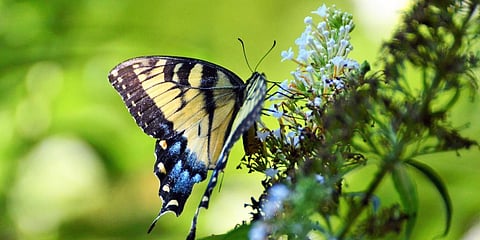

Instability in yield of pollinator-dependent crops figured as ‘serious’ or ‘high risk’ in South America, Asia, Africa and Oceania
In Europe and North America, the risk was ‘moderate’. This is because crops dependent on pollination are not as widely grown and are less important to the total agricultural output of these regions, according to the paper.
The research by an international team of scientists was published in the journal Nature Ecology & Evolution August 16, 2021.
Critical existence
Around 40 per cent of the invertebrate pollinator species, particularly bees and butterflies, face extinction across the world, according to a report by Food and Agriculture Organization.
Loss of wild pollinator diversity and crop pollination deficits have been identified as serious risks in all the six regions covered in the study.
This is especially concerning for Africa and the Asia-Pacific, where pollinated crops are of notable nutritional and economic value to livelihoods and well-being.
A decline in non-timber products such as honey and wild fruits in Latin America puts the region at risk. It has a large variety of indigenous people dependent on subsistence agriculture and natural resources.
Lynn Dicks from the zoology department of University of Cambridge, who led the study, said:
What happens to pollinators could have huge knock-on effects for humanity. These small creatures play central roles in the world’s ecosystems, including many that humans and other animals rely on for nutrition. If they go, we may be in serious trouble.
These findings are all the more significant because pollinator-dependent food production increased 300 per cent over the past half century, according to the 2016 Assessment Report by Intergovernmental Science-Policy Platform on Biodiversity and Ecosystem Services.
Reduction in the quantity or quality of food, fibre, fuel or seed that can be produced as a result of pollinator loss, is another global risk underlined in the study.
Climate change can worsen decline
Destruction of habitat, improper land-use such as grazing, fertilisers and crop monoculture of farming, along with high pesticide use have been identified as the leading causes behind the declining pollinators.
There is scientific evidence that establishes a link between flowering plants, their pollinators and climate change.
Climate change ranks as the fourth cause behind declining pollinators. Data on this, however, is limited, flagged the researchers.
Extreme weather events like extreme rainfall and temperature attributed to climate change are already a threat to crops. Loss of pollinators further adds to the existing crisis, Dicks stated.
The impact of climate change will increase in the coming decades and is very likely to interact with other drivers of pollinator decline, according to the study.
The scientists called for focus on climate change mitigation and adaptation in pollinator research and conservation strategies.